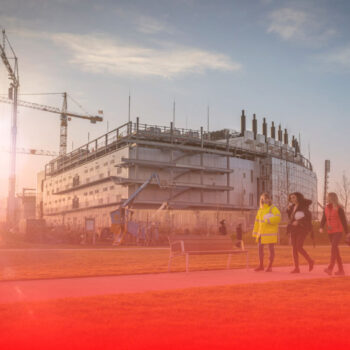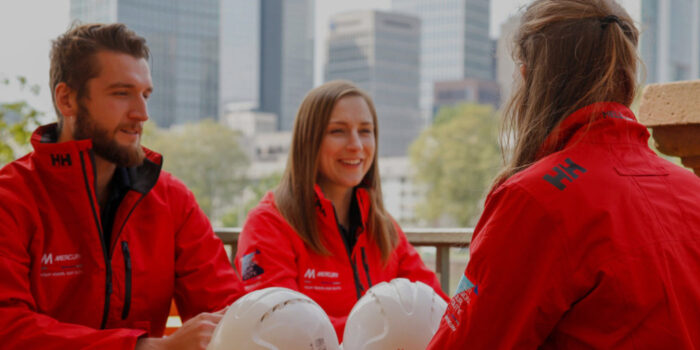Nachrichten und Einblicke

Delivering with certainty: How Mercury embraced an agile new approach on GTR’s 40.5MW GB1 data centre project
At Mercury, we consistently embrace challenging opportunities, and always seek to build on our capabilities as a global player committed to delivering leading edge construction solutions for our valued clients. Daniel Coughlan, Engineering and Design Manager recently undertook a complex data centre project for Global Technical Realty (GTR) with the Mercury Central Engineering team. Daniel and our design and engineering teams, alongside our supply chain partners, took a bold approach to the design process on the 40.5 MW, GB1 data centre project located just outside London, embracing an Engineering, Procurement and Construction (EPC) approach.
This approach marked a significant step forward for Mercury as a key partner to our clients, providing them with the best support throughout the lifecycle of a project. “On this data centre project, we got involved at the very outset and led the project from phase zero, overseeing all the design work right through to construction.” Daniel, who started his career as an electrician in his hometown of Cork before becoming a Chartered Electrical Engineer, credits GTR for their “trust in taking a new approach.”

Delivering efficient results from start to finish
Despite requiring a departure from the teams’ previous methods of working, Daniel comments that leading the design process “from inception to completion resulted in a lot of benefits for our client and our team on the ground as well.” “We work to the industry recognised RIBA Plan of Work, and our teams would often come onboard a project at work stage three or four when much of the design process has already been completed, and Mercury then lead the construction. Having a role during those earlier stages and bringing the entire design process in-house transformed everything for us.” Daniel notes that Mercury’s supply chain was “invaluable and critical” throughout, helping “make the project lifecycle far more seamless.” The key benefits of the EPC approach include “increased efficiency and fewer changes to the working schedule which helped to foster strong partnerships with both the client and wider supply chain.”
One Mercury team, one clear approach
What did this actually involve though? Daniel is quick to remark that a crucial step of EPC was Mercury’s early engagement in the vendor selection process. “On the majority of data centre projects, the Long Lead Equipment such as generators and transformers are owner furnished and contractor installed which means as general contractors we are not involved in the ordering or selection process.” However, Daniel notes that being involved in the ordering and coordination of the equipment that the construction team would later install proved more efficient – “in today’s market the lead time on Long Lead Equipment can be up to 52 weeks, so it gave us that extra level of control and removed barriers between the design and construction phases of the project. This granted our team on the ground a clearer insight into updates to the schedule and installation process and helped contribute to a reduction in project waste. Instead of there being multiple teams working across different stages, we were unified as one team delivering the entire project under Mercury.”

Adopting a systems way of thinking
Daniel recalls that adopting a “systems way of thinking” when approaching the early stages of the project was integral to his team’s success. “We saw our role as designing and then coordinating all the systems which made up an advanced data centre project.” These include the main all-encompassing system, which is the data centre building itself, as well as the other systems which are crucial to it running successfully, such as the sub-station and fuel farm. Daniel and his team worked hard to “ensure that all these systems are integrated so that the entire data centre eco-system can perform, making for a smooth and efficient project lifecycle. This meant that as the design phase came to a close, our construction team was given that extra level of insight before breaking ground.”
The team began construction work on the project in the summer of 2022 and first handover of Building 1 of 3 to GTR is due in early December 2023. Daniel recognises GTR for their “commitment to this approach, which was a new frontier for us, but one which paid off immensely. It couldn’t have been done without our team and wider supply chain who worked tirelessly to deliver.” But ultimately, the process has proved rewarding. “Getting to see the project come to life from the very outset has been fulfilling.”
Having that control when it came to design, and vendor and equipment selection meant that Mercury’s team was better prepared for the construction phase, with “a strong foundational knowledge about the intricacies of the project, which allowed us to deliver far more efficiently for our client.” Looking ahead to the future, Daniel sees immense value in Mercury taking this approach on more projects. “This way of working gives the client a competitive advantage in a sector where time to market is critical, and the process for our teams and supply chain has proved more coherent and efficient, ultimately giving clients better, faster results,” noting that “it’s an approach we look forward to taking on more projects with GTR in mainland Europe going forward.”
ABOUT MERCURY
Mercury is the European leader in construction solutions. We build and manage complex engineering & construction projects for the world’s leading corporations. Our solutions help deliver technologies that connect people, communities, and businesses, giving them the power to achieve incredible things. Our people have the courage to be innovative. Their determination and sharp focus enable us to deliver with certainty, time and time again.
Follow us on LinkedIn, Facebook, and Instagram.


